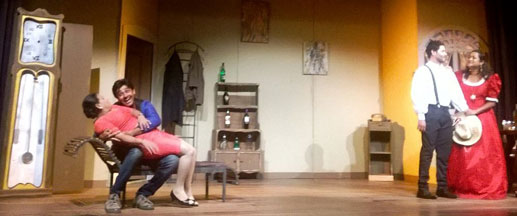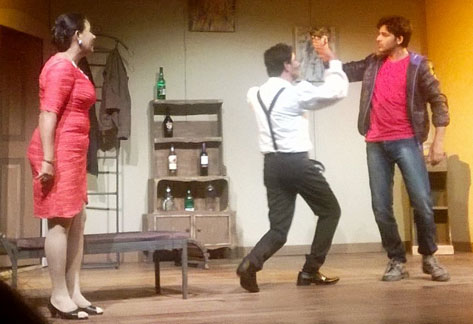|
 A review of the Sinhala stage play MaAra Horu: A review of the Sinhala stage play MaAra Horu:
A farce to tickle the funny bone
by Dilshan Boange
Many years ago, I watched what was then a popular Sinhala stage play
named Horu Samaga Heluwen (translated verbatim as 'Naked with Thieves')
with veteran actor, Jayalath Manoratne as the burglar, senselessly drunk
to forget the indiscretions he had become privy to, in the course of his
'work'. However, I recall it as something of a fusion with another story
that involved a street sweeper, played by Saumya Liyanage. When I saw
the posters and advert boards of Maara Horu, as a Sinhala play based on
the play by Italian dramatist Dario Fo, I wondered if it was another
rendition of Horu Samaga Heluwen? The two Sinhala plays I can vouch for,
(if my memory has not deceived me) are not different renditions of
exactly the same script.
 On June 18, I sat in the gentle darkness of Punchi Theatre, and
witnessed a beam of flashlight streak through the entrance to the
auditorium, signalling the commencement of a burglary, and revealed the
figure of popular screen actor Saranga Dissasekera, who made his steps
down the aisle and onto the stage. Maara Horu (translated as
'Fantastic/Unbelievable Thieves') is said to be based on Dario Fo's,
'The Good A Burglar Can Bring'. The original Italian play by Fo is
entitled Non tutti i ladri vengono a nuocere, and has been made into the
English adaptation as, 'The Virtuous Burglar' by Joe Farrell, and
translated as 'The Good A Burglar Can Bring Ed Emery'. The latter is the
script one assumes, director Anura Withanachchi translated to Sinhala as
Maara Horu. Considering how the nature of some of the characters are
revealed, to show the duplicitous lives they lead, beneath the veneers
of virtue and honour, the Sinhala title aptly suits the essence of what
is depicted about the people and society. On June 18, I sat in the gentle darkness of Punchi Theatre, and
witnessed a beam of flashlight streak through the entrance to the
auditorium, signalling the commencement of a burglary, and revealed the
figure of popular screen actor Saranga Dissasekera, who made his steps
down the aisle and onto the stage. Maara Horu (translated as
'Fantastic/Unbelievable Thieves') is said to be based on Dario Fo's,
'The Good A Burglar Can Bring'. The original Italian play by Fo is
entitled Non tutti i ladri vengono a nuocere, and has been made into the
English adaptation as, 'The Virtuous Burglar' by Joe Farrell, and
translated as 'The Good A Burglar Can Bring Ed Emery'. The latter is the
script one assumes, director Anura Withanachchi translated to Sinhala as
Maara Horu. Considering how the nature of some of the characters are
revealed, to show the duplicitous lives they lead, beneath the veneers
of virtue and honour, the Sinhala title aptly suits the essence of what
is depicted about the people and society.
Manoeuvres
Adulterers get caught with their pants down, metaphorically speaking,
while a burglar gets caught red handed, but neither is able to complete
the intended act due to 'mistimed' manoeuvres.
The big and capacious grandfather clock is a principal catalyst in
this regard. Although utterly inanimate what a 'grand function' that
object performs as part of the stage set and the household of the Deputy
Mayor, whose house is to be the site for the burglary and adultery, the
same night!
Maara Horu is a great One Act farce performed truly, commendably and
deftly to tickle the funny bone of the audience. It is a farce that
promises comedic chaos based on the hilariality of indiscretions that
lead to mix-ups where confusion becomes the order of the day -or rather
'night' since the whole story unfolds in the course of a late night
bordering on daybreak. At the heart of the play is the question, whose
conscience is really at stake in the midst of the string of
misadventures? And, can any of them by means of the facades they create,
achieve the intended ends? It is a comedy that stings its critique at
middle class morality.
Stagecraft
Stagecraft was of a realist theatre mode and appreciable. The
household had a stock of classy spirits. Chevas Regal, Johnny Walker Red
Label, Bailey's Irish Cream, Famous Grouse, Absolut Vodka, were the five
visibly identifiable brands from the eight bottles stacked on the rack.
 When the bottle of Red Label was said to be a whisky that cost four
hundred pounds one must take it to mean not the 'brand' of the bottle
per se, but a highly priced Scotch for which the bottle of Red Label is
meant to stand for. Understandably, the producer can't spend for a
bottle of Scotch a price that fits the dialogue, simply to make a stage
prop out of it! When the bottle of Red Label was said to be a whisky that cost four
hundred pounds one must take it to mean not the 'brand' of the bottle
per se, but a highly priced Scotch for which the bottle of Red Label is
meant to stand for. Understandably, the producer can't spend for a
bottle of Scotch a price that fits the dialogue, simply to make a stage
prop out of it!
A criticism I would raise on how props and their functionality are
welded into the performance by players, is with regard to the telephone,
which plays a pivotal role in unleashing chaos.
The telephone, a typical land line is 'stationed' on the phone stand.
But, it is eventually handled as though there is no encumbrance of a
cord, because, there actually is no cord. The result is, the way it is
'handled' is unrealistic for a phone meant to be, as colloquially
called, a 'land phone'.
In 'Run for Your Wife' produced and directed by Indu Dharmasena,
which I watched on February 19 this year, the presence of the phone cord
was something visible and presented a simple, yet pressing facet for a
realistic manner in which the telephone would be handled in the course
of an animated performance of a conversation that may agitate or startle
the player.
When does a burglary become a robbery, or are they one and the same?
The play does demonstrate a small facet of it when the guns are turned
on the house owner by the burglar, who initially, breaks into the house
unarmed. Although, to the average person a robbery, a theft and a
burglary may be more or less the same, the legal perception of these
acts differ, since a robbery would involve a direct threat of physical
harm, to the very life of the person whose belongings are forcefully
taken away; whereas a theft would not involve harm, either inflicted or
threatened on the person, who is the victim of the thief.
Adaptation
There was, I couldn't help but wonder, a small sliver of 'adaptation'
in the text of Maara Horu as opposed to it being a strict translation.
What makes me say this is, due to the way in which English lines were
fused to express moments of exclamation and elation that carries
something of the local veneer of certain segments of the middle classes,
to flaunt a bit of English to indicate a heightened sense of delight,
even though the conversation in general may be in Sinhala.
The acting was overall commendable, and can be appreciated for the
sharpness of projection and the lively mood switch. It is a farce well
performed and must be applauded robustly. The audience at Punchi Theatre
certainly found their funny bone tickled by the thespians on stage, that
Saturday evening.
If you like comedy, and find plays such as, See How They Run, No Sex
Please We Are British, Run for Your Wife, tickling your ribs till your
sides split, and you also like Sinhala comedies such as, Romaya Gini
Ganee (A Sinhala translation of British dramatis Ray Cooney's Run for
Your Wife), then Maara Horu will certainly prove to be a treat. |

